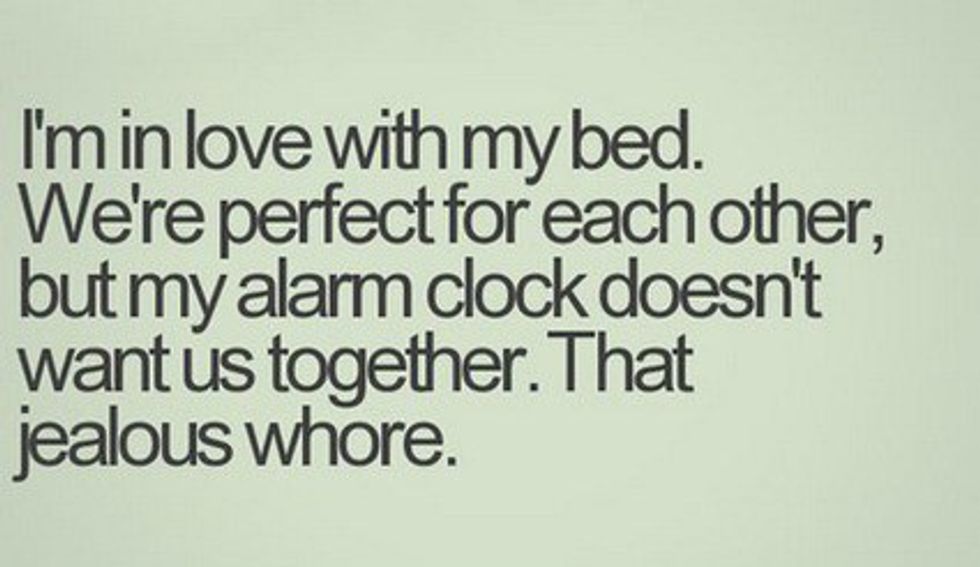"A 'nasty' woman is one who refuses to remain in her proper place, as defined by men. One who challenges male authority."
This past Wednesday, the term "nasty woman" was hurled at a presidential candidate by her opponent in a childish, last-ditch attempt at denigration, and a lot has happened since. Social media platforms have come alive with expressions of rage, disgust and cynical amusement at the desperation and sexism that were shown by the Republican nominee during the debate. The memes are realer than ever, and I'm sure SNL is going to have a field day with their skit for debate number three. There is now a shirt bearing the phrase "nasty woman" inside of a cute pink heart on sale for twenty-five dollars, with 50% of the proceeds going to Planned Parenthood (which said Republican nominee has threatened to defund, by the way.) And perhaps most epic of all, the website nastywomengetshitdone.com is now a direct reroute to Hillary Clinton's website. Whether or not Hillary Clinton's team is actually responsible for that is to be determined, but it's pretty legendary either way.
So what does this all mean? Twenty years ago, this kind of slander towards women was acceptable, maybe even normal. In some parts of the world, even some parts of the United States, it still is. But when Donald Trump called Hillary Clinton a nasty woman, women and feminists everywhere started firing back. Like so many other derogatory terms, we are reclaiming "nasty."
The issue we're facing down is the notion that women have a very specific role that entails a very specific kind of behavior. That role does not involve independence, confidence, strength, sexuality, dominance, etc. Any woman who strays from their predetermined parameters is immediately labeled any number of insults, including but not limited to "slut," "bitch," "bossy," "cold," and everyone's new favorite, "nasty." But piece by piece, women are taking these words back, morphing them from demeaning put-downs into words of empowerment.
Criticism for this on-the-rise custom of turning hate into power is painfully persistent. Much of it comes from the fact that women are beginning to take control of their bodies. The notion that women can dress for themselves, can be sexual because they want to, can act on behalf of their own desires and ambitions rather than acting in response to those of a man, makes people uncomfortable because it's not something they're used to seeing. The belief that men should have a kind of authority or ownership over women is ridiculously outdated but also ridiculously prevalent, and that's why it's so important that everyone sees women taking these words back. Women were made to be autonomous, and in modifying sexist rhetoric into something we control is returning to us a portion of that autonomy.
Seeing Donald Trump call Hillary a nasty woman was just another instance of outdated sexism rearing its ugly head, as it too often does in a society that has supposedly achieved gender equality. It was one of millions of occurrences in which men make efforts to exert their systematically established dominance over women. And it was an attempt among countless attempts to diminish the legitimacy of professional women; attempts made by intimidated, under-qualified men who find their egos bruised by the possibility that their strength does not equal that of their female counterpart.
There is a frantic need in this world to bring down powerful women, to convince them that their place is that which is determined by a man. That kind of tear-down usually happens via condescension and undiscriminating use of words like slut, bitch, or nasty. That's why this movement is so important; that's why it's no insignificant matter that girls all over the world are owning the notion that they're "nasty" in the wake of the debate this past week. Because by taking those words back, by letting them make us strong, by knowing that in every insult and bitter phrase there is a bit of power that we are getting back, if we eliminate everything that's tearing us down, then there's nothing keeping us from building up. Every person has an endless potential for immensity. In the past, we have been barricaded from that potential by the standards that we have had no say in forming. But every girl who's proud to call herself nasty is taking some of that potential back.
Our power is in our voices. So be nasty. Be a bitch. Be hell, and be kind. Nag, be bossy and be cold, be emotional and speak because that's how we're going to close the gap between where we are and where we want to be.
"For I conclude that the enemy is not lipstick, but guilt itself; that we deserve lipstick, if we want it, AND free speech; we deserve to be sexual AND serious -- or whatever we please; we are entitled to wear cowboy boots to our own revolution."
--Naomi Wolf





























